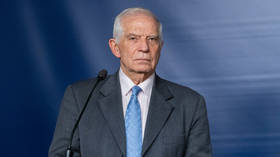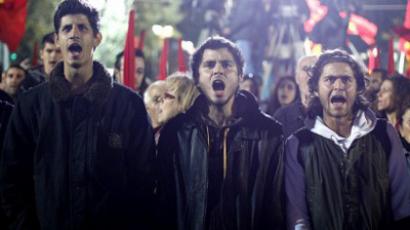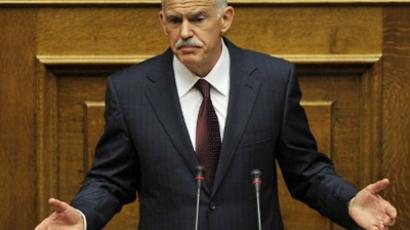Ex-ECB top official to wheel Greece?
Greek politicians have postponed their announcement of a candidacy for the new premier till Wednesday. Tuesday heated discussions almost gave the prize of Greek premiership to Lucas Papademos, a former Vice President of the European Central Bank.
Negotiations for the installation of the new Greek Prime Minister are to be finalized on Wednesday, as leaders of Greek political parties failed to reach a consensus on Tuesday night. Nevertheless, state-run NET TV claimed that ex-central banker Papademos will take the post. Other candidates who were in the running to lead the Greek government included incumbent Greek Finance Minister Evangelos Venizelos – as well as European Union Ombudsman Nikiforos Diamantouros and International Monetary Fund director Panagiotis Roumeliotis.The list of new Cabinet members is also to be settled on Wednesday, reports RIA Novosti news agency.An interim government under a new prime minister will have to focus on implementing austerity cuts demanded by the EU so Greece can get a second tranche of financial aid, comprising some 130 billion euros ($179 billion). A general election is to be held in February.
‘Greece – European country, euro – a Greek word’
RT gave people in Athens a chance to have their say about the mess they face – but is their voice being heard by those in charge?RT set up a camera and microphone on the Syntagma Square which has been the epicenter of so much of the crisis to find out what the Greek people think about it all.“What I want to ask all the people, is why are Greeks blamed? And I want to ask something else, if all the Europeans know that all this debt cannot be paid back, why did they lend all this money to us? Don’t they want their money back?” – one man asked.“Greece is a European country and euro is a Greek word. A Greek word,” he underlined. “It saddens me that right now there is a chance we might lose everything we know in this country. And there is really not much we can do,” said Vicky, a Greek-Canadian living in Greece for ten years.“The thing with the situation right now in Greece is that we don’t feel really secure about anything – about our salaries, our health. Everybody here thinks that things could be better,” another young woman said. “There’s something more than disappointment, there’s something more, they’re angry. We don’t know what will happen tomorrow, you can’t plan your life,” a young man told RT.“I’m 20 years old and I don’t have a job. I have to live with my parents; I don’t have money; I can’t live,” complained a young woman.However some believe that despite the troubles, it would be better for Greece to stay with euro.“Because there is a lot of unemployment in Greece now, people in Greece are very skeptical about the euro. I think it’s better that we are in the euro, of course, definitely. But there are some serious problems,” another man said.“And I hope something can be done so we can save this beautiful country, and be able to pass it on to our grandchildren and the children after that,” concluded Vicky.














